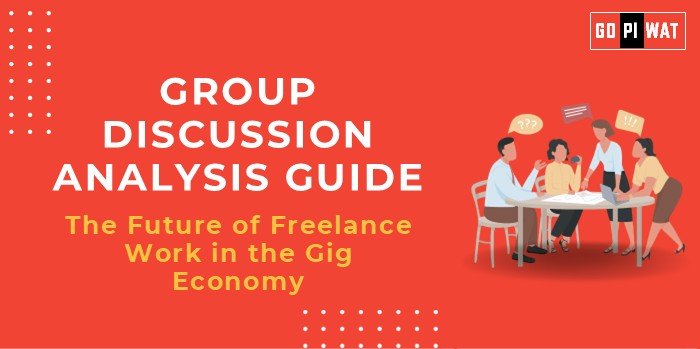📋 Group Discussion (GD) Analysis Guide: The Future of Freelance Work in the Gig Economy
🌐 Introduction to the Topic
- 📌 Opening Context: “The gig economy, fueled by freelancing, is reshaping global employment landscapes, with platforms like Upwork, Fiverr, and Gigster creating opportunities for millions. For business leaders, this evolving employment model is critical to understand, as it represents both a challenge to traditional jobs and an innovation for businesses seeking flexibility.”
- 📌 Topic Background: The gig economy began gaining traction in the early 2010s with the rise of digital platforms. Today, it accounts for a significant share of global employment. Freelancing, a key component, allows individuals to work independently across sectors like technology, design, and content creation, contributing to economic dynamism while raising concerns about job security, income stability, and worker rights.
📊 Quick Facts and Key Statistics
- 🌍 Global Freelance Workforce: Approximately 1.57 billion workers globally in 2023, indicating the extensive reach of the gig economy.
- 💵 Freelance Earnings in the U.S.: Contributed $1.2 trillion to the U.S. economy in 2023, highlighting significant economic impact.
- 🇮🇳 India’s Freelance Workforce: Ranks second globally with 15 million professionals, underscoring the country’s substantial participation.
- 📈 Platform Revenue Growth: Top freelancing platforms have experienced a 30% annual increase, reflecting industry expansion.
- 🛠️ Skill Demand Shift: 70% of freelance projects now require specialized skills, indicating a move towards professionalized gig work.
🤝 Stakeholders and Their Roles
- 👩💻 Freelancers: Offer services across various sectors, balancing flexibility with income variability.
- 🏢 Employers/Businesses: Leverage freelance talent for cost efficiency, scalability, and access to specialized skills.
- 🏛️ Government: Regulates gig work to ensure tax compliance, labor rights, and social security provisions.
- 🌐 Platforms: Facilitate connections between freelancers and clients, manage transactions, and ensure adherence to policies.
🏆 Achievements and ⚠️ Challenges
Achievements
- 🌍 Global Reach: Freelancers can work internationally, breaking geographical barriers and accessing diverse markets.
- 📈 Economic Contribution: Significant input to GDP through flexible, high-skill work engagements.
- 🧑🎨 Diverse Opportunities: Roles span across technology, creative arts, consulting, and more, offering varied career paths.
- 🕒 Work-Life Balance: Provides autonomy over work schedules, enhancing personal and professional life integration.
Challenges
- ⚖️ Job Security: Absence of traditional employment benefits such as health insurance and retirement plans.
- 📉 Income Instability: Earnings depend on gig availability and client terms, leading to financial unpredictability.
- 📜 Regulatory Issues: Evolving labor laws struggle to keep pace with the dynamic nature of gig work.
🌍 Global Comparisons
- 🇺🇸 United States: High participation in gig work, with ongoing debates about worker classification and rights.
- 🇪🇺 European Union: Implementing directives to enhance protections for gig workers, aiming for a balanced approach.
📖 Case Study
- 🇮🇳 India: Experiencing a surge in freelancing within IT and creative sectors, with platforms like Upwork and Freelancer.com playing pivotal roles.
💡 Structured Arguments for Discussion
- Supporting Stance: “Freelancing democratizes employment by offering opportunities to individuals in remote or underserved areas, fostering entrepreneurship and economic inclusion.”
- Opposing Stance: “The lack of consistent benefits and regulatory frameworks renders freelancing a precarious employment model, potentially unsustainable in the long term.”
- Balanced Perspective: “While freelancing offers unparalleled flexibility and innovation potential, addressing systemic challenges is essential for its sustainable future.”
🗣️ Effective Discussion Approaches
- 📊 Opening Approaches:
- “With approximately 1.57 billion gig workers worldwide, the gig economy represents a significant shift in employment paradigms.”
- “Freelancers enjoy flexibility; however, a substantial percentage report challenges in securing consistent income streams.”
- “In India, with 15 million freelancers driving sectors like IT and creative services, the gig economy faces both growth opportunities and regulatory challenges.”
- 📌 Counter-Argument Handling:
- Highlight Benefits: Emphasize the advantages of short-term work options for businesses, such as cost savings and access to specialized skills.
- Regulatory Developments: Point out emerging regulations aimed at improving conditions for gig workers, indicating progress towards more secure employment models.
📈 Strategic Analysis of Strengths and Weaknesses
SWOT Analysis
- Strengths: Flexibility, access to global markets, diverse opportunities, and potential for innovation.
- Weaknesses: Lack of benefits, income unpredictability, limited worker protections, and potential for exploitation.
- Opportunities: Advancements in technology platforms, increasing demand for specialized skills, and the rise of remote work trends.
- Threats: Regulatory uncertainties, market saturation, economic downturns, and potential for worker burnout.
🎓 Connecting with B-School Applications
- 🌍 Real-World Applications:
- The gig economy’s role in shaping new business models, influencing human resource policies, and providing operational flexibility.
- 📚 Sample Interview Questions:
- “How can businesses effectively integrate freelancers into their workforce to enhance innovation and efficiency?”
- “Discuss the impact of the gig economy on traditional employment structures and organizational strategies.”
- 💡 Insights for B-School Students:
- Understand freelancing as a strategic business approach for fostering innovation and agility.
- Explore its potential for cost optimization in startups and established enterprises.
- Analyze policy implications for worker protection and sustainable business practices.


